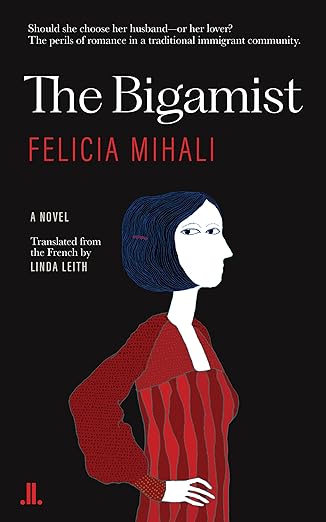2 Stars
I’m not sure whether this book is intended to be an allegory, but I am certain that I didn’t enjoy reading it.
The narrator of this novella is an unnamed immigrant woman from Romania. She comes with her husband Aron to Canada where she tries to adapt to life in Montreal. She meets Roman, another Romanian immigrant, and begins an affair with him, eventually leaving Aron to live with Roman. That’s it in terms of plot.
It’s not difficult to determine that Aron represents the past, the life left behind in Bucharest, whereas Roman represents the present, where she’s trying to integrate into Canadian culture and society. Life with Aron becomes unbearable because of his unwillingness to adapt to their new country but life with Roman, who is “perfectly in tune with the North American lifestyle,” also presents challenges because they clash over things like her thriftiness.
The narrator is the bigamist in that she lives in both the past and present; she keeps house for Roman, but she regularly returns to Aron’s apartment to clean for him too. Aron even comments that she will always have a key for the apartment. The message is that for an immigrant, finding a balance is the key to happiness: “Isn’t that what happiness is? What could be more joyful than being married to both past and present, till death us do part?”
As expected, there are observations about the immigrant experience in Canada. The narrator complains that “The Department of Immigration lumped us all together in the same category” though there are many differences among immigrants from different parts of the world. She also observes how in Romania, “each individual lived within his family and his clan, remaining faithful to their age-old ideas and beliefs” whereas in Canada, “boundaries and class distinctions were fading, and your place in this heterogeneous society was now measured by your occupation” and “The smaller the jar in your [shopping] basket, the more rights you have in this country.”
One issue I had was with the personality of the narrator. Besides being dull, she is not likeable. I understand that her wavering and uncertainty are meant to emphasize her desire to retain things from the past and her desire to find her place in her new country with its different values, but her vacillating becomes annoying and suggests a lack of introspection. Her actions towards Émilie may be symbolic of the narrator’s unwillingness to cut ties with the past, but they are despicable.
There is no doubt that the narrator is to be seen as well-read; the book is peppered with allusions to writers such as Dzevad Karahasan, Edith Wharton, Salman Rushdie, Hanif Kureishi, Kazuo Ishiguro, and Herta Müller. I did find, however, that after a while these literary references come across as a form of name-dropping to impress. On the other hand, though the woman is supposed to be a writer, there is little mention of her actually writing.
What makes this book so tedious is that there is really no tension. I don’t enjoy books that focus only on plot, but in this case there’s the opposite problem: absolutely everything is intended to be symbolic of the immigrant’s conflict between past and present. Rather than a narrative diagram, I imagine the writer created a chart of symbols. Surely this conflict could be developed in a more interesting way. The total lack of dialogue is, for me, a real issue since dialogue is so useful for any number of dramatic purposes. I can appreciate the idea behind the book, but the execution does not impress though, admittedly, it would probably work well for a university course focused on extended metaphor and symbolism.
A writer wanting to convey a theme needs to do so in an interesting and emotionally impactful way or there will be no audience for that message. Unfortunately, I was neither entertained nor emotionally captivated by this book. If I did not feel obligated to write a review for it, I would have stopped reading after a few pages.
Note: I received an eARC from the publisher via NetGalley.

No comments:
Post a Comment